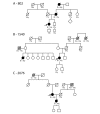A novel germline PALB2 deletion in Polish breast and ovarian cancer patients
- PMID: 20122277
- PMCID: PMC2829009
- DOI: 10.1186/1471-2350-11-20
A novel germline PALB2 deletion in Polish breast and ovarian cancer patients
Abstract
Background: PALB2 protein was recently identified as a partner of BRCA1 and BRCA2 which determines their proper function in DNA repair.
Methods: Initially, the entire coding sequence of the PALB2 gene with exon/intron boundaries was evaluated by the PCR-SSCP and direct sequencing methods on 70 ovarian carcinomas. Sequence variants of interest were further studied on enlarged groups of ovarian carcinomas (total 339 non-consecutive ovarian carcinomas), blood samples from 334 consecutive sporadic and 648 consecutive familial breast cancer patients, and 1310 healthy controls from central Poland.
Results: Ten types of sequence variants were detected, and among them four novel polymorphisms: c.2996+58T>C in intron 9; c.505C>A (p.L169I), c.618T>G (p.L206L), both in exon 4; and c.2135C>T (A712V) in exon 5 of the PALB2 gene. Another two polymorphisms, c.212-58A>C and c.2014G>C (E672Q) were always detected together, both in cancer (7.5% of patients) and control samples (4.9% of controls, p = 0.2). A novel germline truncating mutation, c.509_510delGA (p.R170fs) was found in exon 4: in 2 of 339 (0.6%) unrelated ovarian cancer patients, in 4 of 648 (0.6%) unrelated familial breast cancer patients, and in 1 of 1310 controls (0.08%, p = 0.1, p = 0.044, respectively). One ovarian cancer patient with the PALB2 mutation had also a germline nonsense mutation of the BRCA2 gene.
Conclusions: The c.509_510delGA is a novel PALB2 mutation that increases the risk of familial breast cancer. Occurrence of the same PALB2 alteration in seven unrelated women suggests that c.509_510delGA (p.R170fs) is a recurrent mutation for Polish population.
Figures


References
Publication types
MeSH terms
Substances
LinkOut - more resources
Full Text Sources
Other Literature Sources
Medical
Research Materials
Miscellaneous

